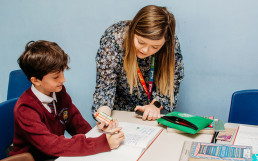- Home
- Teaching & Learning
- Meta-cognition: The ReflectED Approach
Meta-cognition: The ReflectED Approach
ReflectED is an approach to learning that teaches and develops our children’s metacognition skills (learning how they learn). It supports and improves attainment, and aims to help learners of all backgrounds develop the tools to make excellent progress in their learning and fulfil their potential.
ReflectED teaches children the skills of reflection and how to record their learning moments and strategies. Teachers can also look across these reflections to understand what pupils are enjoying or struggling with, and identify specific pupil needs.
Evidence suggests the metacognitive skills children develop through ReflectED will significantly enhance their learning.

How it works
Each class in school explores metacognitive strategies across the curriculum. As the children learn new skills, whether that be mathematical skills, design technology, PE or anything else they are exposed to, they discuss how their brain is responding to the challenge and record this reflection as part of the learning. The purpose of this reflection is to teach children to approach their learning with a sense of wonder, excited by the level of challenge and what lies ahead of them as they grow. We purposefully put the children in a position in which they feel ‘stuck’. We share with the children key messages around ‘having a growth mind-set’, what makes a successful learner, cognition and metacognition, being in ‘The Learning Pit’ and possessing skills of resilience, grit and determination in order to succeed.
Staff support children to scaffold expressing these reflections in increasingly complex ways as they grow. At the earliest level, they simply use colours. Red means they feel stuck, and need to be resilient and find strategies to help them. Yellow means they are getting there, but need to continue to be determined in order to become more confident. Green means they feel confident, and with a little more hard work will become masters of a particular task. Blue means that the children feel so confident about a task that they can ‘coach’ and support a partner to learn. Blue learners are ready to seek additional challenge so that they are stretching themselves to achieve more. As they move through the school, they begin to record their reflections in simple sentences, eventually progressing to deeper metacognitive thoughts around how they are learning.
All staff incorporate the language learned in the metacognition skills lessons across all subject areas, so that the strategies learnt through embracing the ‘struggle’ of learning a new skill creates a crucial learning point for children and equips them with values of resilience, determination and grit that help them succeed across the curriculum. The culture of metacognitive language for learning, modelled by staff, is what supports our children’s own ‘growth-mindsets’, giving them the determination and belief required to be successful.
Across the St. Oswald’s Curriculum, we promote and explicitly praise our children for making and learning from ‘marvellous mistakes’. We embrace a culture where making mistakes is part of life; we are accepting of and positive about each other’s mistakes because we realise that mistakes and being ‘stuck’ are the best opportunities we have to learn. Within this, we unpick the ‘zone of proximal development’ as a visual tool, where children can identify when things are too easy, too hard or just right for them to learn.
By creating a school environment where ‘feeling red’ and learning from mistakes is embraced, we aim for St. Oswald’s children to be resilient and bold, undaunted by failure; instilling life-long skills and values that we see as fundamental to their futures.